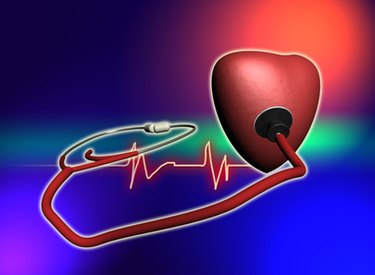
Crucial to muscle contraction and relaxation, potassium is the most abundant electrolyte within your baby's cells. Potassium is a positively charged ion that is responsible for the relaxation of your baby's heart muscle. The book "Miller's Anesthesia" states that the balance of potassium is carefully maintained by the kidneys, aldosterone, the pH, beta-adrenergic agonists, insulin and the concentration of bicarbonate. When your baby's potassium levels elevate above normal, she or he has what is called hyperkalemia. This condition can result in your child experiencing dangerous heart arrhythmias which can lead to death.
Significance
Video of the Day

Maintaining potassium homeostasis is essential to your baby's health. "Harrison's Principles of Internal Medicine" notes that the resting phase of cardiac muscle is due to the flow of potassium ions out of cells. This action allows the heart to relax before the next contraction phase. In hyperkalemic states, the excess potassium alters this process, thus increasing the length of the contraction phase. This causes the contraction time of the ventricles, the lower chambers of the heart, to lengthen per heartbeat. The more time the ventricles spend in contraction, the less time that they have to fill with blood and the less blood is pumped to the body.
Video of the Day
Normal Plasma Levels
Hyperkalemia occurs when potassium levels exceed the normal ranges. According to "The Johns Hopkins Hospital: The Harriet Lane Handbook," normal levels of potassium in neonates fall between 4.1 and 5.3 millimoles per liter (mmol/L) while levels in babies from 1 month to 1 year old range from 3.7 to 5.9 mmol/L.
Infant metabolisms use more potassium per day than adults. For instance, "Miller's Anesthesia" states that a baby needs to intake on average at least 2 to 3 milliequivalents per kilogram per day (mEq/kg/d) of potassium, compared to the 1 to 1.5 mEq/kg/d that adults require.
Causes
"Nelson Textbook of Pediatrics" provides an extensive list of causes of hyperkalemia in your baby, which include medications such as heparin and potassium-sparing diuretics, renal tubular disease, sickle cell disease, lupus nephritis, kidney transplant, primary adrenal disease, acidosis, insulin deficiency and intravenous increased intake. The most common of these causes are kidney failure and decreased insulin levels.
Clinical Manifestations
Diarrhea, arrhythmias, lethargy and abdominal distention are the most common manifestations of high potassium levels in babies, according to "The Johns Hopkins Hospital: The Harriet Lane Handbook." Other signs and symptoms that would indicate a problem with your baby include muscle weakness and paralysis, tetany in severe hyperkalemia and apathy.
Treatment
The treatment of hyperkalemia in your baby depends on the electrocardiogram (EKG) findings. If your baby's EKG is normal, then she is placed on a potassium-free diet. A polystyrene resin called kayexalate is also administered to promote the elimination of potassium through your child's stool. If your child's EKG shows electrical conduction abnormalities, then intravenous calcium, insulin and glucose are administered, according to "The Johns Hopkins Hospital: The Harriet Lane Handbook." If your child unfortunately has a severe case of hyperkalemia, then she may have to go on dialysis when the other treatments fail.